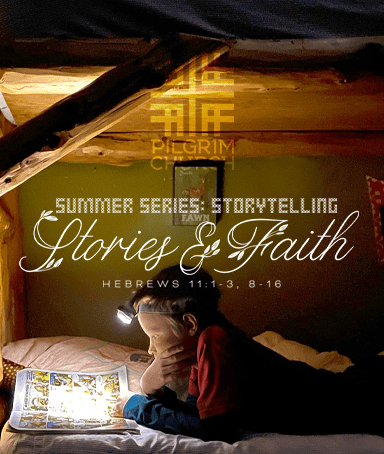TEACHING
|
Your browser does not support viewing this document. Click here to download the document.
|
SUNDAY, AUGUST 7, 2022
10:30 AM SUMMER SERIES: Storytelling Stories & Faith, Hebrews 11:1-3, 8-16 Stories have power. The telling of stories opens our imagination, seeds vision, and can empower us to act. A story can reveal what is wrong and spark ideas for solutions. Our capacity to see a vision of what is not yet through a mind open to the Holy Spirit, ties us to a Jesus-centred vision of our story.
We exercise faith when we imaginatively represent, as a substantial reality, something in the future that we believe to be God’s will. And just as evidence produces a conviction in a person, our imaginative representation produces in us a confident motivation to do what is necessary to bring this imaginative representation into reality.
This is illustrated by the heroes of the faith listed in Hebrews 11. The author writes, “All these people were still living by faith when they died. They did not receive the things promised; they only saw them and welcomed them from a distance” (vs 13). Note the visual imagery in the faith these heroes exercised. They were “looking for a country of their own” (vs 14), and were “longing for a better country—a heavenly one” (vs 16). They imaginatively envisioned “the city with foundations, whose architect and builder is God” (vs. 10), and therefore they lived as foreigners and vagabonds in this world. -G.A. Boyd “Faith is a way of knowing that constantly seeks understanding, leading to theological reflection and to faith as “belief” in various doctrines about God, Jesus, creation, sin, salvation, and human destiny. Faith is often presented, rightly as here, as that which enables one to cope with the trials and tribulation of life, but Hebrews 11 reminds us of another paradox: faith is also that which has provoked the hostility and ridicule being heaped upon this Christian community” -J.C. Shelley, Feasting, 330. TWO MAIN COMPONENTS OF FAITH:
Hebrews 11:13 These all died in faith without receiving the things promised, but they saw them in the distance and welcomed them and acknowledged that they were strangers and foreigners on the earth. 14 For those who speak in such a way make it clear that they are seeking a homeland. 15 In fact, if they had been thinking of the land that they had left, they would have had opportunity to return. 16 But as it is, they aspire to a better land, that is, a heavenly one. Therefore, God is not ashamed to be called their God, for he has prepared a city for them.
|


